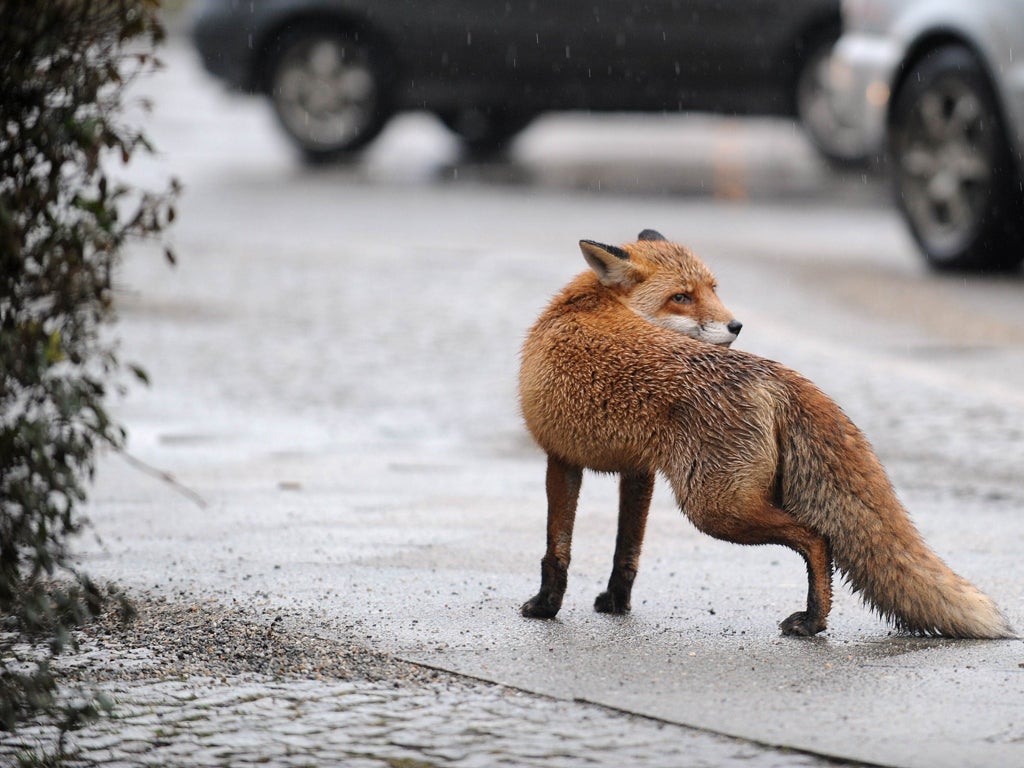Neither cuddly, nor evil – why do foxes makes fools of us all?
Our common sense about foxes has been eroded by the fantasies of film - it is time for some sanity to return to the debate

Forget the bulldog, the lion rampant, the unicorn or the dragon.
There is now only one animal which perfectly represents the confused state of British culture, half-fearful and half-sentimental, and that is the fox. In the wild, it is a survivor – clever, resourceful and good at adapting to the circumstances in which it finds itself. Through no fault of its own, it also brings out the worst in humans.
Foxes are in the doghouse again. In fact, they are increasingly in human houses, snacking on leftovers, cat-food and, very occasionally, babies. To those who live in the country, the behaviour of the urban foxes variety might seem odd and unnatural, like much that goes on in towns, but the recent case of four-week-old Denny Dolan, attacked in south-east London, has confirmed that they behave very differently to their rural cousins.
Another fox-panic is upon us. Mayor Boris Johnson has declared that something must be done about them; Chris Packham, the TV presenter, has rather more sensibly described that sort of reaction as “embarrassing”.
No animal reveals our confused attitudes towards the natural world as clearly as the fox, and the latest incident has seen idiocy on both sides. There are those for whom foxes, like rats, represent the dangerous wild which threatens our health and the lives of babies and pets. These people believe that year by year the Demon Foxes are growing bigger and yet, paradoxically, are also starving and therefore liable to scavenge on waste, before moving into our gardens and then our houses. It is a scary Hollywood vision of a natural world evolving in a mysterious and monstrous way, which has been good box office from The Birds to Jaws. Now it is being taken seriously, even by the Mayor of London.
Ranged against them, there are those who see only the Cuddly Fox. For them, the sight of a wild animal close to humans is such a delight that the contact should be encouraged by regular food and domestication. The Cuddly Fox provides entertainment; it is like a pet which has gone interestingly feral.
Speaking for the Cuddly Fox tendency, the RSPCA has not only opposed a cull, but has suggested that people should remove undergrowth from gardens and use only fox-proof bird-feeders. In other words, the habitat and food of insects and birds should be sacrificed so that foxes are not led into temptation.
This absurdly muddled attitude is hardly surprising. It was only a few weeks ago that the RSPCA had been in full cry against the master and huntsman of the Heythrop Hunt, spending an eye-watering £326,000 on their prosecution within months of having pleaded poverty. Their default position of presenting animals as victims is in its way as silly as those who see them as source of fear and lurking danger.
Sentimentalising or demonising a species reveals how common sense has been eroded by the fantasies of film, whether produced by Disney or Spielberg. The fact is that foxes, like other animals, are neither a threat to humans nor a cosy companion. They are opportunists who will take food where they find it; they are in towns because humans, far filthier than any so-called vermin, like to leave their uneaten food on the street.
Nor have they suddenly developed a taste for human flesh, like a man-eating tiger in India. They are responding, like any animal, to changes in their environment. If foolish humans encourage them into the garden and even the house, they will see those places as a potential source of food.
It is time for a small element of sanity to return to this debate. These are wild animals. If one is sick, it should be destroyed. If a population is out of control, the local council should take action. It is stupid and inhumane to relocate them to the country.
The desire to persecute them as pests or, on the other hand, to cosset them as semi-pets is an insult not only to their wildness, but to our own intelligence.
Mick’s school of manners
With the frosty dignity of a dowager duchess, Mick Jagger has released a statement on the publication of a memoir by his former financial adviser, Prince Rupert Loewenstein. “Call me old-fashioned,” says His Satanic Majesty, “ but it shows that well-brought-up people don’t always display good manners.”
He is right, of course. One would think that a rich man in his eighties would be able to resist the temptation to make a little more money by writing a cash-and-tell memoir.
Then again, Prince Rupert has the right pedigree for this sort of thing. Not only is he a banker – we know about those – but he boasts rather pathetically about his background. His father was Prince Leopold zu Loewenstein-Wertheim-Freudenberg, don’t you know.
An ageing rock star or a minor European royal? No prizes for guessing which of the two has showed decency and restraint.
www.terenceblacker.com

Join our commenting forum
Join thought-provoking conversations, follow other Independent readers and see their replies